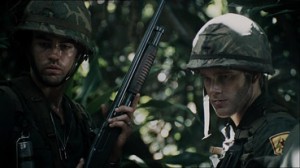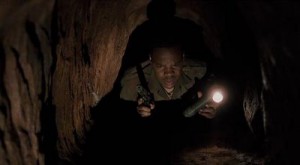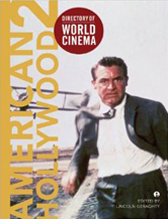
REVIEW: 1968 Tunnel Rats
In a career that spans more than twenty movies to date, Uwe Boll is singularly renowned for one thing: his remarkable lack of talent. The German-born director with an affinity for video-game adaptations (House of the Dead, BloodRayne) has been the subject of online petitions calling for his ‘retirement’, and once fought (and defeated) a number of his critics in a series of organised boxing bouts. However, despite the near universal critical condemnation of his work, with 1968 Tunnel Rats (2008), Boll delivers some unlikely goods.
 Released with little fanfare two years ago, 1968 Tunnel Rats focuses on a platoon of soldiers stationed near Củ Chi, a Viet Cong stronghold and site of an expansive tunnel network in the south of Vietnam. Sent out on a routine patrol, the men find themselves under attack and inadvertently drawn into the depths of the tunnels towards the waiting VC.
Released with little fanfare two years ago, 1968 Tunnel Rats focuses on a platoon of soldiers stationed near Củ Chi, a Viet Cong stronghold and site of an expansive tunnel network in the south of Vietnam. Sent out on a routine patrol, the men find themselves under attack and inadvertently drawn into the depths of the tunnels towards the waiting VC.
As far as the plot goes, that’s basically the extent of proceedings. Contrasted with those Vietnam War films that draw on the pretext of a ‘mission’ to structure narrative (Apocalypse Now, Rambo: First Blood, Part II), Tunnel Rats is more interested in exploring purposelessness and confusion. The absence of any clearly defined objective in the soldiers’ actions works to restage the ambivalence that characterised America’s Vietnam intervention.
However, Tunnel Rats allegorises the broader conflict in other ways too. By focussing much of the film’s duration upon the experiences of the men underground, Tunnel Rats presents in miniature the Vietnam War as a bloody, drawn out and perceptually dislocating experience. The scenes within the tunnels in which the soldiers fall victim to booby traps and stalking Viet Cong, are frequently played out in a protracted manner.
 Darkly lit and shot in tightly composed frames, the tunnel sequences are accompanied by a palpable sense of claustrophobic dread. Such depictions of war have also been used to good effect more recently in the Australian WWI film, Beneath Hill 60 (2010). In many ways though, Tunnel Rats presents a vision of war that, stylistically at least, more closely resembles horror films such as Neil Marshall’s The Descent (2005) or [REC] (2007).
Darkly lit and shot in tightly composed frames, the tunnel sequences are accompanied by a palpable sense of claustrophobic dread. Such depictions of war have also been used to good effect more recently in the Australian WWI film, Beneath Hill 60 (2010). In many ways though, Tunnel Rats presents a vision of war that, stylistically at least, more closely resembles horror films such as Neil Marshall’s The Descent (2005) or [REC] (2007).
But perhaps above all else, what distinguishes Tunnel Rats from most American Vietnam War films is the sense of nihilism felt by combatants upon both sides of the conflict. Even in those Nam films often perceived as critical of the war, such as Oliver Stone’s Platoon (1986), there remained a sense that ‘lessons were learned’, expressed in that instance through the film’s coming of age narrative.
In Tunnel Rats however, there is no act of redemption or heroism that serves to validate the war or the violence that ensued. The Americans are ill-prepared youngsters dreaming of home while the Vietnamese are victims of an invading force and a conflict not of their choosing. Commendably, the film divides its empathy across both forces.
Admittedly, Tunnel Rats is no masterpiece. Despite some genuinely engaging moments and interesting politics the film lacks polish, particularly during the earlier scenes. But in spite of the stale dialogue and historical inaccuracies, 1968 Tunnel Rats is proof that that sometimes, even the worst of directors occasionally have good days.
2 Responses to “REVIEW: 1968 Tunnel Rats”
RSS feed for comments on this post. TrackBack URI





I saw this movie, last night ( 7/5/2011) although there were some strong points, like the tunnel footage, the accuracy and detail was abhorrent. The uniforms were incorrect (epulets & name tags)the helmut camo, which was not used by the Army,( Marines did) was wrong. The jungle boots, were brown, rather than green and the soles were an inncorrect pattern. The rank insignia was also wrong, for the period.
Words such as Geek, were not in use in 1968. The one other part, was the nearly 7 minutes of stabbing a dead body, then nearly 8 minutes of digging, after the cave in. Very tiring, to say the least.
I think it was a good attempt at a war movie, but missed them mark
Hi Greg. I completely agree with you regarding the various inaccuracies that you’ve pointed out. It’s fair to say that this film was probably made with little to no regard to the specifics of the Vietnam conflict and my positive comments were more in relation to those few scenes of genuine suspense as opposed to its representation of the war.
That said, having recently seen Paolo Bertola’s ‘My Lai Four’ (2011) the inaccuracies in Uwe Boll’s film seem minor by comparison.